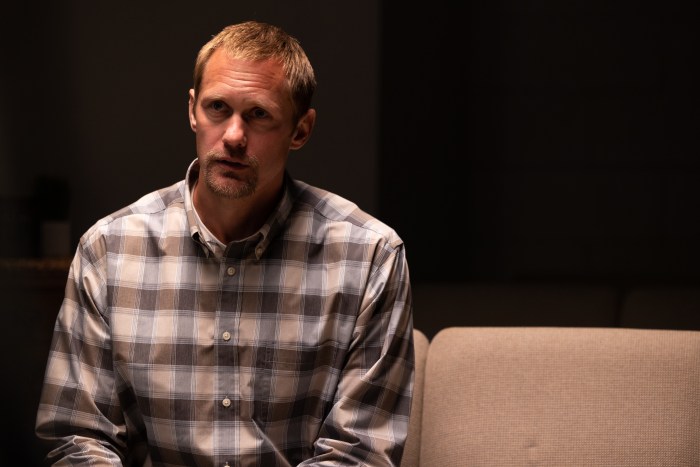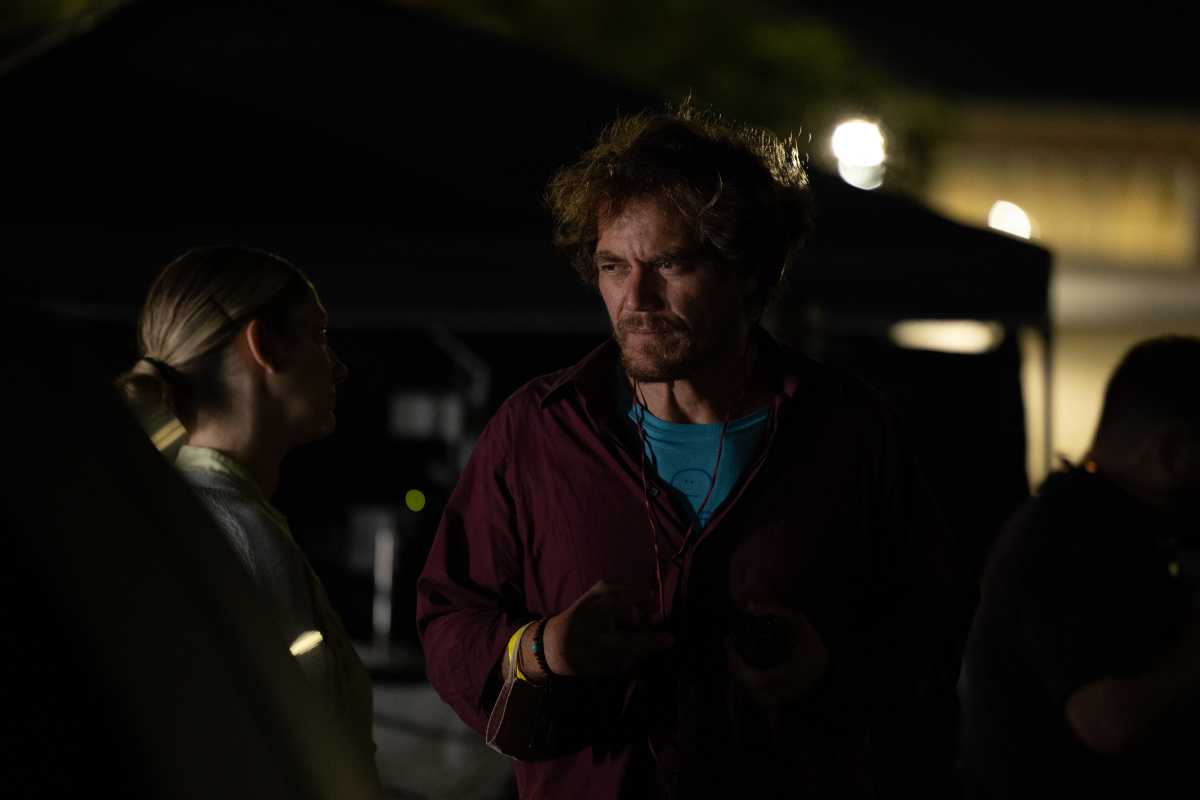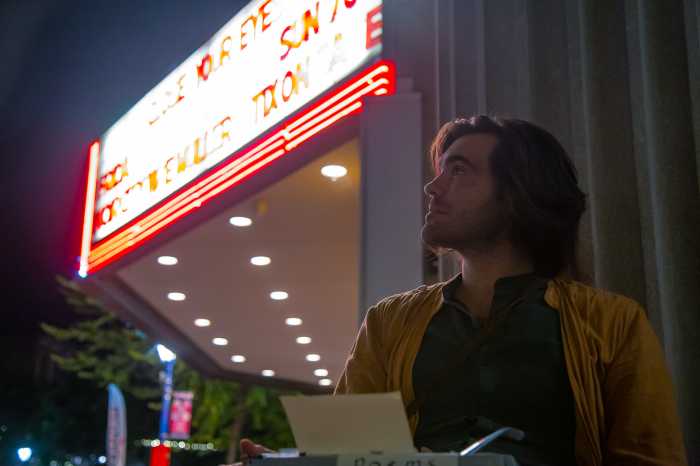The tensioned relationships and aftermath of a shocking crime line the plot of ‘Eric LaRue’, Michael Shannon’s directorial debut. Starring Judy Greer and Alexander Skarsgård, Janice (Greer) and Ron ( Skarsgård) are reeling after their son, Eric (Nation Sage Henrikson) shoots and kills three of his classmates.
Adapted from a 2002 play of the same name, the film examines human connection, grief and confusion through a talented ensemble cast (which also includes Alison Pill, Tracy Letts and Paul Sparks).
To delve more into filming and the themes of ‘Eric LaRue’, Shannon, Greer and Skarsgård sat down to discuss this emotionally charged film and what they took away from it all.
What typically draws you to projects and what drew you to ‘Eric LaRue’?
Shannon: I think I’m drawn to projects that I feel will be thought-provoking in some way and that have some relationship to what we as a society are going through. I’m not so interested in escapism really, although I have done things from time to time in that vein. But by and large, I think that it’s important to make work that provokes people or inspires people to consider their own lives and how they’re fitting into the world. And I feel like this film definitely has that quality about it.
Greer: I would jump off of a really tall building if Michael Shannon told me too. When we first met and we worked together years ago, [I asked] do you ever want to direct? And he was like, f*ck no — and I’m quoting directly. So then when he said to me, I want to direct this movie and I want to send it to you—it was interesting.
So that’s one. And two, the script, it scared me so much. Telling the story really scared me. So I’m always thinking oh, if something really scares me, I should probably do it. I didn’t know how I felt about all of this…and that was an exploration for me, and it still is.

Skarsgård: I second what Judy said. Michael and I worked together on this limited series ‘The Little Drummer Girl’ a bunch of years ago. And we’d also known each other through mutual friends for many, many years. I adore him and Michael is one of the finest actors I’ve ever had the pleasure of working with in front of the camera. And we got to know each other pretty well, those six months of shooting ‘The Little Drummer Girl’, so I was just floored when Michael reached out and asked if I wanted to be in his directorial debut.
I was so honored that he would even think of me. For me, it was one of those [projects] where you basically say yes, no matter what the role or script is. It was just a bonus when he did send me the script, it was just incredible. This character was fascinating.
Michael, with the intense storyline of this film, how do you as a director give the actors space and safety to be able to get that emotional?
Shannon: There’s a lot in opposition to that, particularly when you don’t have a lot of money and you don’t have a lot of time. I’ve been on a lot of low-budget films where that sense of panic is just prevalent all the time. Like, oh, we’ve got to get this done or we are screwed—And I just really put up a big firewall to that. I said, I don’t care, I don’t want that on my set.
So we had the fortune of having a lot of locations that were pretty easy to deal with. It wasn’t like we were trying to recreate the Indy 500 or something, it was just people sitting in a room talking, which helps a great deal. And the odd thing was, with one exception, I think we were done early every day. I don’t even know how that happened, but we would usually be done a half hour, an hour early. I think partially it was just because the actors were so prepared.
Nobody was ever calling for a line or saying, what’s my motivation here? Everybody showed up with not just preparation, but a vision for what they thought was important. But they were also very open to hearing my thoughts. But yeah, you really hit the nail on the head. I know it sounds odd considering the subject matter and the tenor of the film and the tone of the film, but it really is just about staying calm. Nothing much comes out if you’re all uptight and anxious all the time. You’ve got to just relax and try and breathe through it.
Judy and Alexander, tell me about your characters and how they handle the grief and confusion they face in the film?
Greer: Janice is so lost. I think she wants answers and she wants help. I don’t think this woman started out with a really healthy social life anyway, and then when everything is stripped away because of a tragedy like this… I liked the themes of looking for comfort within your grief and how do you find it. I mean, there are so many statistics about marriages that end in divorce after the loss of a child, after a tragedy or a trauma. So obviously we see them heading in that direction.
I think that the person that you are in that small space with can either be your greatest comfort or the person who drives you away. You just get driven apart by your search for comfort, and everyone deals with their grief in a different way. Janice’s story is just how lost and afraid and alone she is. For her, if we had seen her story leading up to this moment in time, I think she had a really hard time asking for help and asking for love. And so the fact that she’s doing this in this part of her life is probably a big deal for her.

Skarsgård: Ron desperately tried to make sense of what happened, and I believe he was in shock. When you’re lost at sea, you find a piece of driftwood, and he’s holding onto that for dear life, and that is religion for him. He finally finds something where there’s an explanation and there’s a clear reason why this happened and there’s a greater plan, and that gives him oxygen that helps him through this. I think he’s ready to just succumb and be devoured by this intense grief, and there’s a very particular kind of grief where you feel lonely in it because you’re not part of the victim’s family. You’re part of the prosecutor’s family.
So people won’t line up outside your door to give you food and give you a hug or talk to you and listen to you and be there with you. So in his church, in his group, he gets those answers and someone in a position of authority telling him it’s fine. This happened for a reason and God has a plan for Eric. And I think Ron takes comfort in that and is holding onto that notion for dear life, and that is helping him through it. But that also creates this friction and fissure between him and his wife.
What dynamics from the themes and the side characters were interesting to explore overall in ‘Eric LaRue’?
Shannon: Even though it has the title of just one person’s name, it’s very much a story about a community. It’s one of the beautiful things when Brett (Neveu), the writer, changed it from a play to a screenplay. In the play version, you don’t get as much of a sense of the community as you do in the screenplay. I’m so glad that he added all these characters in.
There’s something societal that’s happening right now that leads people to feeling such extreme alienation and loneliness and powerlessness that they do things like this. I don’t think that that’s all the responsibility of simply the parents. I think it’s something that we need to ask ourselves as a culture in general. Why do people wind up feeling like they need to do things like this? It obviously doesn’t make any sense, but it happens all the time.
There’s a micro version of that, which is very much about the family, but there’s also a macro version of it, which is us as a country. We’re the United States of America, so we are united. If we are truly united and this keeps happening, then we as a country need to consider why that might be.
‘Eric LaRue‘ releases in theaters April 4.



























